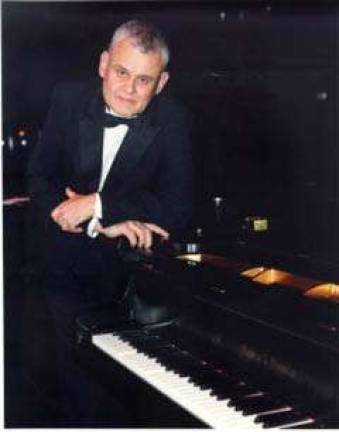Slippery Keyboard King

Terry Waldo swings the blues for locals at JALC
Midway through the second session of keyboardist/writer/producer/author Terry Waldo's four-part course on early 20th century ragtime pianist James P. Johnson (Tuesdays, 6:30-8:30 at Jazz at Lincoln Center), he scans the room from his perch at the piano. "Is there anybody here who wants to play the Blues who doesn't play the piano?" he asks. A man volunteers. "We're going to play "The Jazz at Lincoln Center Blues" in the key of E flat," Waldo announces as the volunteer, face partially shielded by a baseball cap, slips into a seat to Waldo's right.
"Make something up using only the black keys," he instructs his duet partner. "If you play in the key of E flat using only the black notes at the top, you can make up a Blues because you're using only those 'blue notes.' I want you to bring out all of your pain and anger, about Obamacare or whatever is bothering you." Waldo launches a driving Blues intro at the bottom of the scale, and the student comes in on key, marching up and down the right-hand black keys, working it. "Oh, you do play the piano," Waldo observes. "We felt each other," he tells the class. "That's the way we roll here, we communicated."
The classroom is packed, and no wonder. Waldo, who was dubbed by The New York Times as a "ragtime pianist nonpareil" and also plays tuba and banjo, draws on an encyclopedic store of knowledge about ragtime, swing, stride, Blues, early jazz and their offshoots, in part because his Columbus, Ohio, childhood home was across the street from the world's second largest collector of ragtime vinyl, piano rolls, and jazz films. At age 20, he moved to New Orleans and then San Francisco, so he could jam with the legends. Back in Ohio, he taught college and played in his bands. A written request to Eubie Blake asking for the sheet music to "Charleston Rag" led to a 16-year close working and personal relationship until Blake's passing.
Besides nearly 5 decades of concert and club playing internationally and in NYC, where he now lives, Waldo's produced and arranged over 40 albums and composed for television shows ranging from The Tonight Show to Ken Burns' Unforgivable Blackness: The Rise and Fall of Jack Johnson. In 1978, he was music director, producer, and talent for the first two-way television operation, Columbus-based Warner Qube. "Andy Kaufman came on as a Vegas character singing 'On the Street Where You Live,'" Waldo recalls. "The audience at home zapped him off but he came back to interrupt the other acts. He was wonderful." Waldo is also credited with sparking off the ragtime revival of the 1970's with This is Ragtime, the 26-part 1974 series he produced for NPR, which led to his definitive 1976 book of the same title (revised and republished by Jazz at Lincoln Center in 2010).
Laidback and engaging onstage and in class, Waldo evokes the vivid, freewheeling personalities and music of the musicians he loves and the true measure of their achievements without over-sanctifying them, illustrating information with CD tracks, vintage film footage, his own live playing, and leavening the discourse with his dry, occasionally self-deprecating wit.
Following the improvised "Jazz at Lincoln Center Blues" that punctuated a discussion of the differences between ragtime and Blues (genres he terms, like others, "slippery"), Waldo accompanied himself singing "my own Blues, but it doesn't have 12 bars," making a salient point while cracking up the room with such lyrics as "Your pencil's run out of lead/It's just lying there dead/Should have popped some corn or read a novel instead/You got them can't get it up Blues."